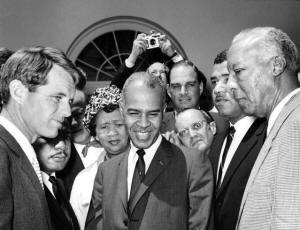|
Americans reflect on Martin Luther King
Jr's legacy 50 years on
 Send a link to a friend
Send a link to a friend
 [March 29, 2018]
By Kia Johnson [March 29, 2018]
By Kia Johnson
MEMPHIS, Tenn. (Reuters) - A half century
after Rev. Martin Luther King Jr.'s death, visitors still flock to the
Memphis, Tennessee, site where the civil rights leader was assassinated
and say that while there has been progress in racial equality, more
strides need to be made.
"We still look like there is a shadow over us, still seems like
something is holding us back," Charles Wilson, a black man from
Mississippi, said during a recent visit to the site.
On April 4, 1968, King, 39, was shot on the balcony of the Lorraine
Motel in Memphis. The motel is now part of the National Civil Rights
Museum, which includes Room 306, preserved as it was when King stayed
there, and vintage cars parked out front.
A Baptist pastor and civil rights activist, King worked to end legal
segregation of blacks in the United States. He gave his famous "I Have a
Dream" speech at the August 1963 March on Washington, and won the Nobel
Peace Prize in 1964 at age 35 - the youngest man to have received the
award.
Despite King's advocacy of nonviolent resistance, the days immediately
following his death were marked by rioting in several American cities.
Thousands of National Guard troops were deployed.

Wilson, the recent National Civil Rights Museum visitor, and his son
Charles Jr. were among those who contemplated King's legacy and the
status of civil rights in the United States.
"I think that the changes that people fought for as far as voting and et
cetera, a lot of people don't take advantage of it, and a lot of people
gave their lives for that right, they fought for it and people now don't
appreciate it," Wilson Jr said.
Nancy Langfield, a white woman visiting from Missouri, said politicians
in Washington do not reflect the racial makeup of the United States.
[to top of second column]
|

Attorney General Robert F. Kennedy meets with civil rights leaders
in the Rose Garden of the White House, Washington, D.C., June 22,
1963. Pictured (L-R) are U.S. Attorney General Robert F. Kennedy;
President of the Southern Christian Leadership Conference (SCLC),
Dr. Martin Luther King, Jr. (partially hidden); President of the
National Council of Negro Women, Dorothy Height; Executive Secretary
of the National Association for the Advancement of Coloured People
(NAACP), Roy Wilkins; unidentified man (in front); attorney James H.
Scheuer (in back); President of the National Urban League, Whitney
M. Young, Jr.; President of the Negro American Labor Council (NALC),
A. Philip Randolph. Abbie Rowe, National Parks Service/JFK
Presidential Library and Museum/Handout via REUTERS

She deplored what she called the rhetoric coming out of Washington,
calling it hateful and mean. "I look at the government and it looks
very white to me, and then I think about the country and it doesn't
seem overly white to me," Langfield said.
For Hyungu Lee, of Tennessee, who visited the museum with his
family, King's legacy is still alive.
"Even though he is not here, I feel that his spirit is with us now,
and because of him, our human rights is getting better and better,
so I feel really thankful," Lee said.
(Reporting by Kia Johnson; Writing by Suzannah Gonzales; Editing by
Matthew Lewis)
[© 2018 Thomson Reuters. All rights
reserved.]
Copyright 2018 Reuters. All rights reserved. This material may not be published,
broadcast, rewritten or redistributed.
Thompson Reuters is solely responsible for this content.
 |